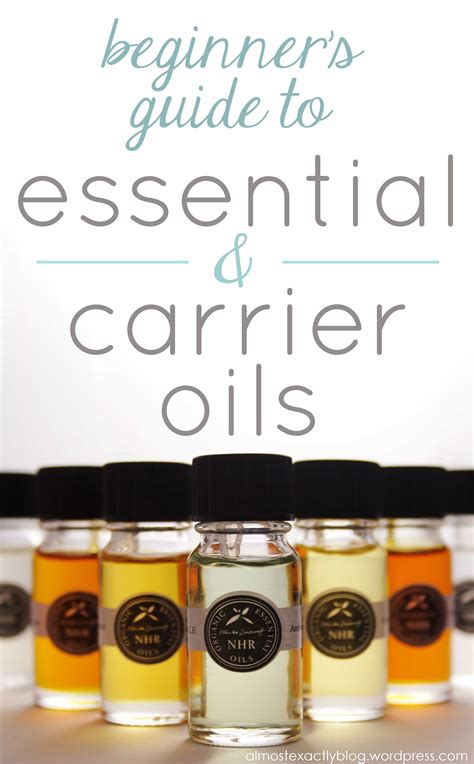Summary:

Essential oils offer a wide range of therapeutic benefits, but they must be diluted in a carrier oil before topical application. This guide provides comprehensive information on carrier oils, including their properties, benefits, and how to choose the right one for your needs.
What are Essential Oil Carrier Oils?
Essential oil carrier oils are neutral oils derived from plants, nuts, or seeds. They have no significant aroma or therapeutic properties, making them ideal for diluting essential oils and facilitating their absorption through the skin. Carrier oils help protect the skin from irritation and enhance the absorption of essential oils into the bloodstream.
Benefits of Using Essential Oil Carrier Oils
- Prevent skin irritation: Essential oils are highly concentrated and can cause skin reactions in some individuals. Carrier oils dilute the essential oil and minimize the risk of irritation.
- Enhance absorption: Carrier oils help essential oils penetrate the skin’s surface, promoting better absorption and maximizing therapeutic benefits.
- Prolong shelf life: Essential oils mixed with carrier oils have a longer shelf life than pure essential oils.
- Versatility: Carrier oils can be used in a variety of applications, such as massage, aromatherapy, and DIY beauty products.
How to Choose the Right Carrier Oil
The choice of carrier oil depends on your skin type and the essential oils you are using.
For Normal Skin:
- Jojoba oil
- Sweet almond oil
- Sunflower oil
For Dry Skin:
- Coconut oil
- Avocado oil
- Apricot kernel oil
For Oily Skin:
- Grapeseed oil
- Hazelnut oil
- Rosehip oil
For Sensitive Skin:
- Argan oil
- Hemp seed oil
- Calendula oil
Properties and Benefits of Common Carrier Oils
| Carrier Oil | Properties | Benefits |
|---|---|---|
| Jojoba oil | Similar to skin’s natural sebum, non-greasy | Moisturizing, anti-inflammatory, antibacterial |
| Sweet almond oil | Rich in vitamins and minerals | Nourishing, calming, softening |
| Coconut oil | Solid at room temperature, antibacterial, antiviral | Moisturizing, soothing, wound-healing |
| Grapeseed oil | Light and non-comedogenic, high in antioxidants | Anti-inflammatory, anti-aging, skin-tightening |
| Argan oil | Rich in vitamin E and fatty acids | Anti-aging, moisturizing, hair-conditioning |
Table: Mixing Ratio of Essential Oils to Carrier Oils
| Application | Dilution Ratio |
|---|---|
| Massage | 2-5% essential oil to 95-98% carrier oil |
| Bath or shower | 5-10 drops of essential oil to 1 tablespoon of carrier oil |
| Diffuser | 5-15 drops of essential oil to 100mL of carrier oil |
| Skin care products | 1-2% essential oil to 98-99% carrier oil |
Tips and Tricks
- Always dilute essential oils in a carrier oil before topical application.
- Patch test the mixture on a small area of skin before applying it to a larger area.
- Store diluted essential oils in a dark, cool place.
- Avoid using essential oils that are contraindicated for your health conditions or pregnancy status.
Common Mistakes to Avoid
- Using pure essential oils directly on the skin without diluting them.
- Mixing too many essential oils in a single blend.
- Expecting immediate results from aromatherapy.
- Overusing essential oils or carrier oils.
- Storing essential oils in direct sunlight or high temperatures.
Frequently Asked Questions
- What is the best carrier oil for all purposes? Jojoba oil is a versatile carrier oil suitable for most skin types.
- Can I use olive oil as a carrier oil? While olive oil is safe for skin, it has a strong aroma that can interfere with the therapeutic benefits of essential oils.
- How often should I use essential oil carrier oils? The frequency of use depends on the essential oils being used and your individual needs. Start with small amounts and gradually increase as needed.
- Is it safe to ingest essential oils mixed with carrier oils? No, it is not safe to ingest essential oils, even if they are diluted in a carrier oil.
- Can I use carrier oils by themselves? Yes, carrier oils can be used as moisturizers or massage oils on their own.
- How do I clean a diffuser that uses carrier oils? Follow the manufacturer’s instructions. Typically, you can wipe it with a damp cloth or use a diffuser cleaning solution.
Conclusion
Essential oil carrier oils are an essential component of aromatherapy. They enhance the absorption of essential oils, prevent skin irritation, and prolong their shelf life. Choosing the right carrier oil and using it properly is crucial for maximizing the benefits of essential oils. By following the guidance in this article, you can safely and effectively harness the therapeutic power of essential oils for your well-being.
